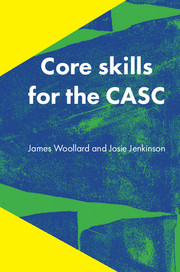8 - Group preparation
from Part 2 - Planning your preparation
Published online by Cambridge University Press: 01 January 2018
Summary
We think it is very important that a large part of your CASC preparation takes place with a group of peers who are sitting the exam at the same time as you or with peers who have sat the exam recently. Here are our top ten tips.
Size of the group – four people is a good number. This allows for one person to be absent on occasion, leaving enough people to run stations usefully.
Ground rules – as you will be aware from your readings of group dynamics, ground rules are important. For a group to be mutually supportive you should be clear on what is expected from all members, such as punctuality, prior preparation, and giving constructive feedback. You all need to feel safe enough to make a fool of yourself. If you do not, perhaps this is not the group for you.
Organise and prepare – organise a schedule for covering topics/ specialties and plan sessions in advance so you can work around people's other commitments.
Membership – try and work with people you get on with, who have complementary experiences or skills in different subspecialties to ensure you can cover everything. You want to consider whether the group members are all at the same level of preparation.
Consistency – the group will work best if you are consistent in your sessions. We would suggest weekly sessions in the few months before the exam, and then you may wish to increase the frequency in the last month before the exam.
Fun – make it a rewarding experience. Plan to do something relaxing after the session (e.g. sharing a meal, going for a run, going to the pub). Each member could take it in turn to host the group and provide refreshments.
Feedback – videoing your stations and watching them back as a group can be useful in giving specific feedback. You could agree a structured way of recording feedback on a sheet. See the example structured feedback sheet on non-verbal communication skills in the Appendix. In general, be specific but not personal, honest and constructive, and think with the others how you might do something differently rather than simply criticising.
- Type
- Chapter
- Information
- Core Skills for the CASC , pp. 43 - 44Publisher: Royal College of PsychiatristsPrint publication year: 2016



